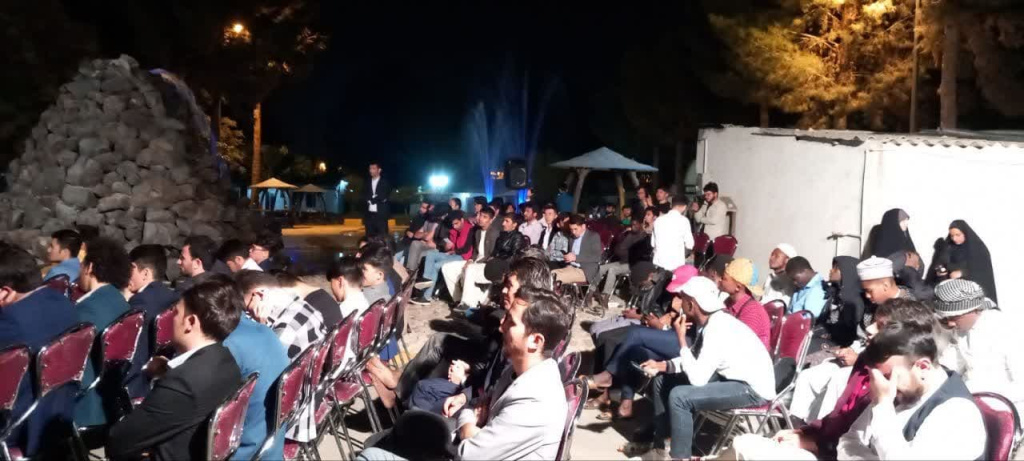AhlulBayt News Agency (ABNA): The Iftar ceremony for students and a group of professors of AhlulBayt (a.s.) International University was held by the Deputy for Cultural and Students Affairs of the university on the 27th night of the Holy month of Ramadan. Before the Iftar, Hojat al-Islam Dr. Jazair Ma’mui, President of the university, delivered a speech.
Ramadan is a holy month
The Lord of the Worlds said, “The holy month of Ramadan is my month.” Ramadan is a holy month because it is clearly mentioned in the Holy Quran. In this month, we can all feel the purity of our souls.
Purification of the human soul is the goal that the prophets pursued for many years. In one of the verses of Surah Al-Jumu'ah, the purpose of the prophets’ mission is clearly stated. The late Allameh Tabatabai says this verse with literature unique to the Quran: “We sent Prophets both to people who have the knowledge and to people who do not benefit from the knowledge.”
The mission of the prophets is cultivation (of the soul) and education
The main question that arises is what was the mission of the prophets? In the Holy Quran, this mission is presented in two forms. God says, “یزکیهم و یعلمهم” (cultivate and teach them) which means one mission is the cultivation of the souls of human beings, and the other is their education. Dear students, you need to pay serious attention to these two missions.
So, what is the purpose of this university complex that you are in?
This scientific and academic complex, where you from different countries of the world have gathered as students, is truly international. Because when you pass by each other on the campus of this university, you will meet other students of different nationalities, and this is valuable. This is the soul that is beloved by the Lord of the worlds. In two to three parts of the Holy Quran, the differences between the human races are mentioned, and this is the will of God.
If we look at this difference of race, culture, and language with the subtle eyes of the Quran, we will find that this difference is constructive and purposeful, and each of you and I can complement each other, and be influential in reaching each other’s perfection.
The meaning of “یزکیهم” in the Holy Quran is ethics and the acquisition of moral virtues.
According to the Quran, the first mission of the prophets is that of “یزکیهم” (cultivate them). In simple terms, the meaning of this word is ethics.
But in response to why in this verse, God has put ethics before teaching, it can be said that the mission of the prophets is ethics-oriented and wisdom-based. In fact, there must be ethics in the beginning so that science can lead to human progress and happiness through it. Otherwise, science can cause danger.
If a person is a scientist, but ethics are not developed in him, and he lacks moral virtues, such a person can become a source of danger and concern for society.
For example, the atom is useful and effective in the fields of medicine and engineering, but if a person benefits from science at the time of using the atom, but lacks ethics, it will create a danger. Therefore, cultivation takes precedence over education.
Dear students, your goal in this university is education and ethics
The second step is the “یعلمهم” (teach them). The goal of you, dear students, in this university, is education. Here the subtlety of the verse “وَيُزَكِّيهِمْ وَيُعَلِّمُهُمُ الْكِتَابَ وَالْحِكْمَةَ” (to purify them, and to teach them the Book and wisdom) (Holy Quran, Surah: Al-Jumu'ah, Verse: 2) is revealed. That is, the knowledge that you, students acquire has two parts, the first part is focused on revelation, and the second part that accompanies revelation is thought and wisdom.
Don’t think that what is meant by knowledge is the same thing that is translated into modern sciences, but it should be accompanied by the Quran. Because knowing the Quran is a valuable skill.
The second part is wisdom, that is, the knowledge that is placed in the heart with reason, thought, and reasoning. Our goal in this university, which is named after AhlulBayt (a.s.), is to pay attention to education and cultivation along with academic knowledge. As much as we provide the conditions for progress in the field of knowledge, thought, and science for you dear ones, we will also provide the basis for cultivation.
Considering its international nature, my request to the Deputy for Cultural and Students Affairs of the university is to create a platform for moral cultivation, growth, and prosperity, along with the interaction between different nationalities. This is our goal, and we need your cooperation in this regard.
As a scientific society, we welcome the knowledge that one of its wings is wisdom, and the other wing is adherence to the Quran. The term “the Infallible and Immaculate AhlulBayt” does not belong to a specific movement or a specific group.
The highest and best hadiths in honor of Imam Ali (a.s.) were written by the elite scholar Ahmad Hanbal in his book “Manaqib Amirul Momineen”. Also, when Hakim Neyshaburi, a prominent figure of the Islamic world, elite, historian, and mathematician, wrote the book “Mustadrak”, he said, “Clinging to the AhlulBayt (a.s.) is the most important aspect of “حبل الله” (God’s rope).
I hope that with the blessing of these days, and the blessed name of this university, you students will be role models for the Islamic world both in terms of learning science and morals, and I hope that whenever you return to your countries, you will be mentioned as role models both in the field of science and in the field of ethics.
..........................
End/ 345

